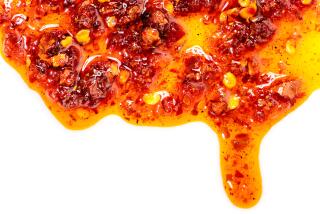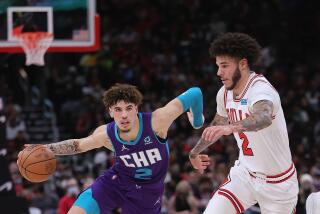Kiwi Picks Fight With Muhammad Ali : Suit Says Can of Ex-Champ’s Shoe Polish Brand Is Too Similar
- Share via
No one would mistake former heavyweight boxing champion Muhammad Ali for a kiwi bird, but Kiwi Brands--the nation’s largest shoe polish maker--says Ali’s Champion Brands Industries shoe polish cans look an awful lot like Kiwi’s.
The two brands aren’t exactly alike--Kiwi sports an illustration of its namesake, New Zealand’s Kiwi bird, and Champion portrays Ali’s square-jawed profile. The Champion can is also slightly smaller and heavier.
But Kiwi, a unit of Sara Lee Corp., says Champion Brands copied Kiwi’s familiar red, black and gold colors and lifted the instructions, word for word, from Kiwi cans. Kiwi is suing Champion Brands for violating federal trade laws in U.S. District Court in Charlotte, N.C., where Champion shoe polish was found on sale in a local K mart.
In a telephone interview, Ali called the lawsuit “unfortunate” and questioned Kiwi’s right to claim the colors as its own. “Anyone who can read can see my name’s not Kiwi,” said Ali, who maintains a residence in the Hancock Park section of Los Angeles. “And I hope I don’t look like no kiwi bird.”
Wants Ban on Sales
Kiwi, which said it spends $30 million yearly to promote its shoe polish, says Champion’s “virtually identical” cans have cost it at least $1 million in damages to its trade, reputation and good will. Kiwi wants Champion to stop selling the shoe polish because it thinks its customers might be confused.
More confusing, perhaps, are events that led to the introduction of Champion shoe polish.
It started more than a year ago, when Arthur Morrison, a one-time record producer and Ali’s business partner, approached Kiwi to discuss a Muhammad Ali shoe polish. After several discussions, Kiwi executives asked Morrison to show them a sample can. In February, 1985, Morrison unveiled his proposal--a red, black and gold can with Ali’s profile. “We told them no way could we proceed with marketing a can that looked like ours,” said Paul Hill, a spokesman for Sara Lee.
Ali says that he--not Kiwi--canned the deal and decided to make his own polish after he learned that Kiwi had a plant in South Africa. “It wouldn’t look good to my people if I got involved with a company that made shoe polish in South Africa,” he said.
Ali also claimed that Kiwi had been “kicked out” of the Nigerian marketplace because of its South African ties.
“They wanted to go back in with me on the can,” Ali said. “I wouldn’t do it.”
Not so, says Kiwi. The Douglassville, Pa., company says it is the No. 1 shoe polish in Nigeria, where it has been sold since 1976. The company does have a plant in Pinetown, South Africa, but does not ship products from there to Nigeria. Instead, it ships Kiwi products to Nigeria from France, the United States and Britain in order to comply with a Nigerian ban on South African products.
Sam Okonkwo, a commercial attache at the Nigerian Embassy in Washington, said: “Kiwi has never been banned.”
Undaunted, Ali’s company plans to fight the suit and continue to sell the polish, which has had $500,000 in sales since February, Morrison said. Ali said he’s pleased with the sales. “Let the people decide if they’re making a mistake in selecting our brand,” Ali said.
More to Read
Go beyond the scoreboard
Get the latest on L.A.'s teams in the daily Sports Report newsletter.
You may occasionally receive promotional content from the Los Angeles Times.










